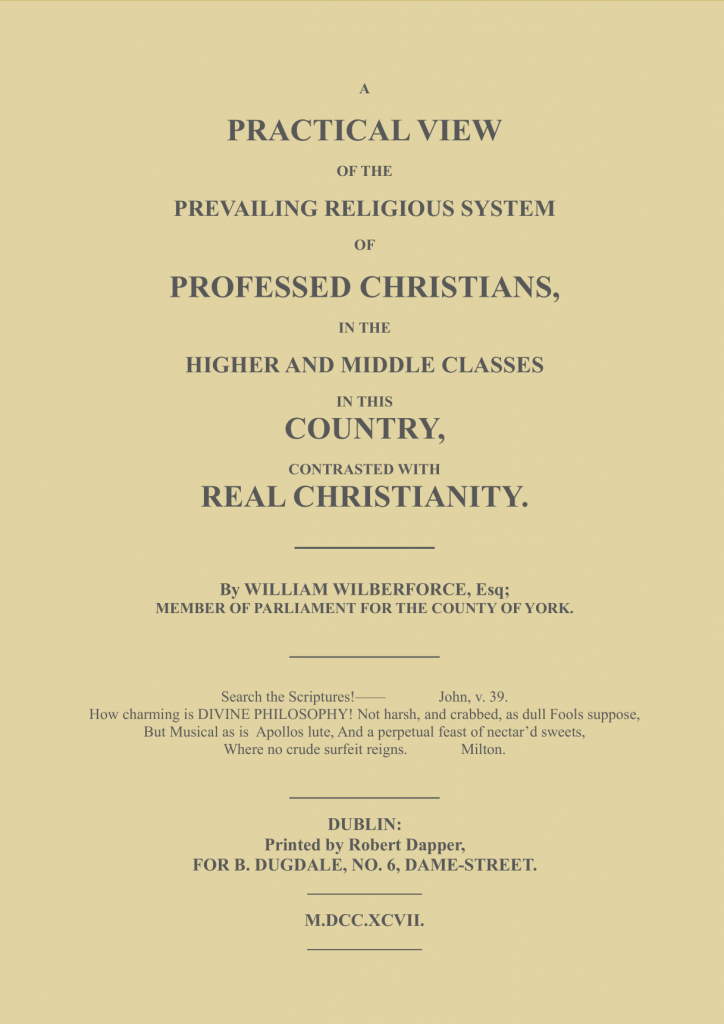A Practical View of the Prevailing Religious System of Professed Christians in the higher and middle classes in this Country, contrasted with Real Christianity

A PRACTICAL VIEW OF THE PREVAILING RELIGIOUS SYSTEM OF PROFESSED CHRISTIANS,
IN THE HIGHER AND MIDDLE CLASSES
IN THIS COUNTRY, CONTRASTED WITH REAL CHRISTIANITY.
BY WILLIAM WILBERFORCE , Esq;
MEMBER OF PARLIAMENT FOR THE COUNTY OF YORK.
Search the Scriptures!—— John, v. 39.
How charming is DIVINE PHILOSOPHY! Not harsh, and crabbed, as dull Fools suppose, But Musical as is Apollo’s lute, And a perpetual feast of nectar’d sweets, Where no crude surfeit reigns. ——–Milton.
About William Wilberforce:
William Wilberforce (1759–1833) was a British politician, philanthropist, and a key figure in the movement to abolish the transatlantic slave trade. Born in Kingston upon Hull, England, Wilberforce entered politics and became a Member of Parliament for Kingston upon Hull in 1780 and later for Yorkshire in 1784.
One of Wilberforce’s most significant contributions was his relentless advocacy for the abolition of the slave trade. He was deeply moved by his Christian beliefs and, under the influence of evangelicalism, underwent a spiritual awakening that led him to dedicate his life to social reform. He became associated with a group of like-minded individuals known as the Clapham Sect, who were committed to various social justice causes.
Wilberforce first introduced a bill for the abolition of the slave trade in 1789, but it faced strong opposition. Over the years, he continued to advocate for the cause, presenting evidence of the inhumane treatment of slaves and the brutality of the slave trade. Finally, in 1807, the Slave Trade Act was passed, making the slave trade illegal in the British Empire.
Wilberforce’s efforts did not stop there. He continued to campaign against slavery itself, and in 1833, just three days before his death, the Slavery Abolition Act was passed, marking the culmination of his lifelong dedication to the cause. The Act led to the gradual emancipation of slaves in the British Empire.
In addition to his work on abolition, Wilberforce was involved in various other philanthropic and social reform efforts, including advocating for animal welfare, promoting education, and supporting missionary work. His legacy is remembered not only for his role in ending the slave trade but also for his broader contributions to humanitarian and social causes.
William Wilberforce was not only known for his efforts in social and political reform, particularly in the abolition of the slave trade, but he also wrote and spoke extensively on matters of religion. His Christian faith played a significant role in shaping his worldview and motivating his commitment to social justice.
Wilberforce was part of the Clapham Sect, a group of evangelical Christians who were active in various philanthropic and social reform endeavors. He wrote and spoke about his faith, moral values, and the application of Christian principles to public life. One of his notable works is “A Practical View of the Prevailing Religious System of Professed Christians in the Higher and Middle Classes of this Country Contrasted with Real Christianity,” published in 1797. In this book, Wilberforce argued for a more sincere and practical expression of Christian faith in daily life, challenging the nominal Christianity he observed among the upper classes.
Throughout his life, Wilberforce engaged in theological discussions, wrote letters, and participated in efforts to promote moral and spiritual values in society. His faith was integral to his identity and motivated his activism, whether it was in the abolition of the slave trade or his advocacy for various other social and moral causes.
CONTENTS OF THE BOOK:
INTRODUCTION.
CHAPTER I. Inadequate Conceptions of the Importance of Christianity.
CHAP.TER II. Corruption of Human Nature.
CHAPTER III. Chief Defects of the Religious System of the bulk of professed Christians, in what regards our Lord Jesus Christ, and the Holy Spirit—with a Dissertationconcerning the use of the Passions in Religion.
CHAPTER IV. On the prevailing inadequate Conceptions concerning the Nature andtheStrictness of Practical Christianity.
CHAPTER V. On the Excellence of Christianity in certain important Particulars. Argument whichresults thence in Proof of its Divine Origin.
CHAPTER VI. Brief Inquiry into the present State of Christianity in this Country, withsomeof theCauses which have led to its critical Circumstances. Its Importance tous asapoliticalCommunity, and practical Hints for which the foregoing Considerations giveoccasion.
CHAPTER VII. Practical Hints to various Descriptions of Persons
Looking for a Hardcover or Paperback?
For those who want to have a hardcover or a paperback of this book, I want to suggest you to look here